The scientific report UNESCO chair on Science and communication technology
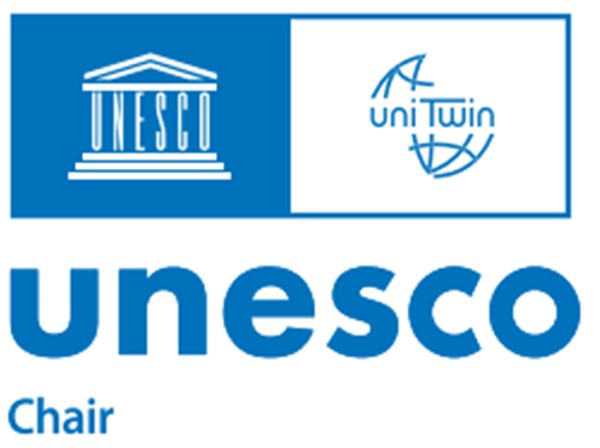
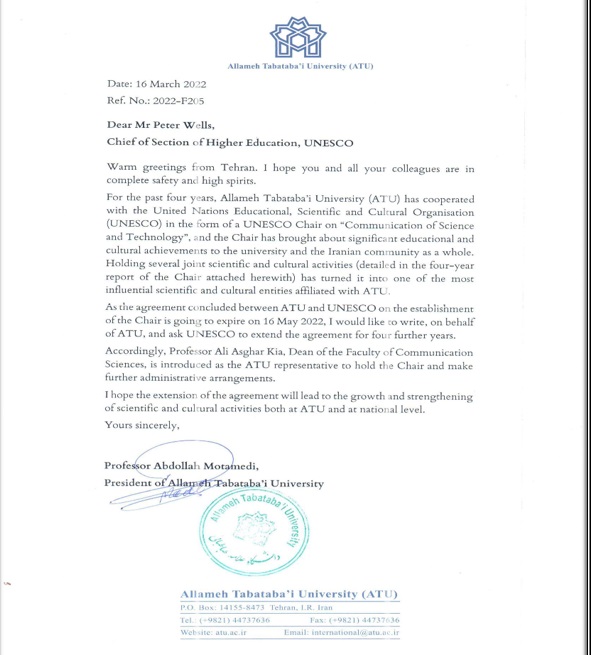
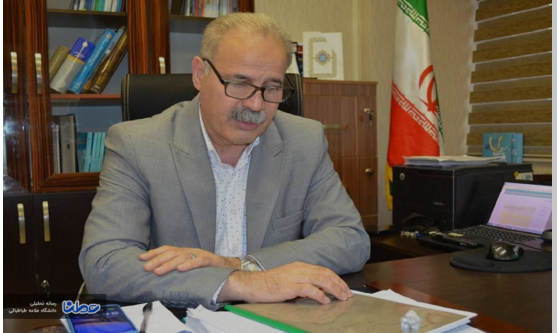
Dr.ali asghar Kia
Dr. Ali Asghar Kia serves as the Dean of the Faculty of Communication Sciences at Allameh Tabataba'i University (ATU) and is a prominent figure associated with the UNESCO Chair on Communication of Science and Technology at the university. His leadership emphasizes the ethical dimensions of media and communication, aiming to uphold principles such as societal commitment, professional integrity, and honesty. These values align with his broader vision of fostering credible and impactful media practices, particularly in today's rapidly evolving digital landscape.
Dr. Kia actively participates in initiatives under the UNESCO Chair, which focuses on bridging the gap between science, technology, and society. For instance, he has led discussions and specialized seminars addressing topics such as the ethical implications of artificial intelligence and the role of science in sustainable development. These initiatives aim to promote interdisciplinary research and enhance public engagement with science and technology.
The UNESCO Chair at ATU, established in 2018, facilitates communication between scientific communities and the public through innovative approaches like science journalism and media training. It also engages in collaborative research and education, striving to democratize science and technology in Iranian society and beyond. Dr. Kia's leadership plays a crucial role in aligning these efforts with the university's academic and ethical standards.
Members of the UNESCO Chair on Science and Technology Communication
Faculty of Communication Sciences, Allameh Tabataba'i University
No. Name Position Email Address
1 Dr. Ali Asghar Kia Chairperson keya@atu.ac.ir
2 Dr. Davood Hosseinpour Member of the Policy Council hosseinpour@atu.ac.ir
3 Dr. Abdollah Mo'tamedi Member of the Policy Council moatamedy@atu.ac.ir
4 Dr. Reza Saberi Member of the Policy Council r.saberi@atu.ac.ir
5 Dr. Ferehteh Azadi Parand Member of the Policy Council parand@atu.ac.ir
6 Dr. Mohammad Bagher Khoramshad Member of the Policy Council khoramshad@atu.ac.ir
7 Dr. Mohammad Mahdi Molaei Member of the Policy Council mmmowlaei@atu.ac.ir
8 Dr. Kaveh Bazargan Head of the Communications and International Affairs Committee kbazargan@atu.ac.ir
9 Dr. Seyed Reza Naqibolsadat Head of the Research Committee Naghibsadat@atu.ac.ir
10 Dr. Abbas Asadi Head of the Education Committee abbas.asadi@atu.ac.ir
11 Dr. Hossein Ali Afkhami Head of the Publications and Information Committee afkhami@atu.ac.ir
12 Ms. Mojgan Hajikhani Executive Director of the Chair M_hajikhani@atu.ac.ir
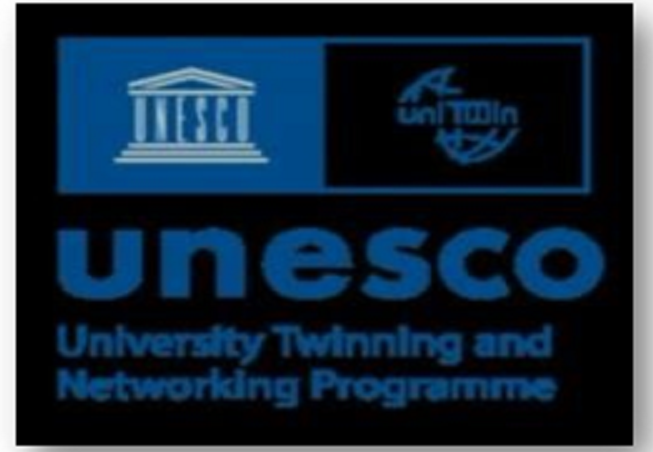
Scientific Report: Collaboration on Publishing
Open Educational Resources on AI Applications in Education
On November 9, 2024, Allameh Tabataba'i University's Faculty of Communication signed an international agreement with UNESCO’s Paris office to publish open-access educational resources in Persian. The collaboration centers on the application of artificial intelligence (AI) in teaching and learning processes, aligning with UNESCO's broader goals of promoting innovative educational technologies.
Key Milestones and Background
The initiative stems from UNESCO's earlier publication, "Artificial Intelligence and the Educational System: A Strategic Guide for Policymakers", authored by Fulchin Mio, Director of the Department of Technology and AI Applications at UNESCO Paris. Originally published in English in 2021, the book has since been translated into multiple languages, including Chinese, French, Spanish, Arabic, and Russian, with the Persian edition added to this repertoire.
The Persian translation, initially undertaken by Dr. Kaveh Bazargan and published by Kando Kav Press in 2022, will soon be re-released jointly by Allameh Tabataba'i University and UNESCO. The launch is scheduled for Digital Learning Week 2025.
Summary of the Book’s Content
The book explores the transformative role of AI in education, emphasizing the need for responsible implementation to avoid reinforcing outdated practices. Its chapters cover the following areas:
1. AI Technologies: Introduction to machine learning, neural networks, natural language processing, and their applications in education.
2. Educational Applications: Insights into personalized learning, administrative optimization, and teacher development.
3. Ethical Considerations: Focus on data privacy, algorithmic bias, and the importance of inclusivity in AI-driven solutions.
4. Challenges and Risks: Discussion on mitigating inequality, job displacement, and the ethical use of student data.
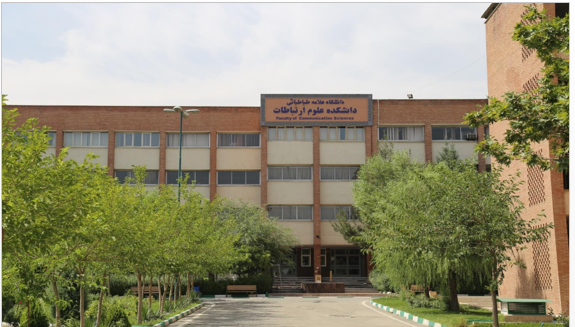
The UNESCO Chair on Science and Technology Communication at Allameh Tabataba'i University (ATU) is a significant initiative aimed at promoting the effective dissemination of scientific and technological knowledge. Established in 2018, this chair reflects UNESCO’s mission to foster international collaboration in education, science, and culture, and to address global challenges through interdisciplinary research and education.
Historical Context and Vision
The UNESCO Chair on Science and Technology Communication at Allameh Tabataba'i University represents a dynamic initiative grounded in UNESCO’s mission to integrate science into broader societal frameworks. Its foundation reflects a commitment to fostering scientific literacy, encouraging public engagement, and promoting ethical practices in the application of technology. As a leader in the humanities and social sciences in Iran, Allameh Tabataba'i University provides the ideal academic environment for the Chair's operations.
The Chair’s vision is deeply rooted in the idea that science and technology must be communicated effectively to ensure public understanding and informed decision-making. This involves demystifying complex scientific ideas and creating accessible narratives that resonate with diverse audiences. A central goal of the Chair is to bridge the gap between researchers and the public by fostering dialogue and building trust, which is essential for addressing societal challenges such as climate change, health crises, and the ethical implications of emerging technologies.
The Chair operates on a multi-faceted framework that prioritizes interdisciplinary research, educational outreach, and the development of innovative communication strategies. By integrating disciplines such as artificial intelligence, health communication, and environmental studies, the Chair explores the interactions between technology and society. This approach ensures that its projects remain relevant to contemporary issues while fostering collaboration across academic and professional fields.
One of the Chair’s most significant contributions lies in its efforts to enhance public scientific literacy. This involves designing educational campaigns and resources that simplify complex concepts, making them accessible to non-specialist audiences. These initiatives target diverse demographic groups, including students, educators, and policymakers, emphasizing the importance of science in everyday life. Additionally, the Chair organizes interactive workshops and seminars, providing platforms for direct dialogue between scientists and community members.
Promoting ethical practices in the use of technology is another cornerstone of the Chair’s mission. As technological innovations continue to shape modern society, questions about privacy, data security, and the societal impact of artificial intelligence have become increasingly pressing. The Chair addresses these issues through research and public discourse, advocating for responsible innovation that aligns with societal values.
The Chair’s educational and training programs are designed to empower individuals with the skills needed to communicate scientific concepts effectively. This includes specialized training for researchers on how to present their findings to non-expert audiences, as well as workshops for educators on integrating science communication into their teaching methods. These programs also extend to policymakers, ensuring that scientific evidence informs decision-making processes at all levels of governance.
In addition to its local impact, the Chair actively engages in international collaboration, contributing to global discussions on sustainability and science communication. By partnering with other UNESCO Chairs and organizations such as the World Health Organization, it fosters the exchange of knowledge and best practices. This global network enables the Chair to address challenges that transcend national borders, such as climate change and public health.
Looking to the future, the Chair aims to expand its research and outreach activities. This includes exploring new methods of communication, such as the use of artificial intelligence to analyze public attitudes toward science and technology. By leveraging data-driven insights, the Chair can develop targeted strategies that address specific societal needs. Furthermore, the Chair plans to deepen its focus on the intersection of sustainability and technology, ensuring that its initiatives contribute to a more equitable and sustainable future.
In essence, the UNESCO Chair at Allameh Tabataba'i University serves as a vital bridge between science and society. Its work underscores the importance of effective communication in building a scientifically informed and ethically conscious global community. Through its innovative approach and commitment to collaboration, the Chair continues to inspire progress in science communication both locally and globally.
Objectives and Activities
The UNESCO Chair on Science and Technology Communication at Allameh Tabataba'i University (ATU) is a pioneering platform dedicated to advancing the role of communication in addressing scientific and technological challenges. Its mission is deeply rooted in fostering a better understanding of science and technology's societal impacts through education, research, and public engagement. Below is an expanded exploration of its key objectives based on the framework provided:
1. Enhancing Research
The UNESCO Chair on Science and Technology Communication at Allameh Tabataba'i University (ATU) embodies a forward-looking initiative aimed at bridging the gap between complex scientific advancements and societal understanding. This Chair leverages interdisciplinary research, innovative communication
strategies, and global partnerships to address modern challenges in science communication while promoting societal engagement with scientific developments.
Interdisciplinary Research for Societal Benefit
One of the Chair’s fundamental goals is to integrate communication sciences with technological advancements in areas such as artificial intelligence, health, and environmental studies. Collaborative research focuses on how these technologies influence communication systems and societal dynamics. For instance, projects exploring the ethical dimensions of AI aim to ensure transparency and accountability, addressing public concerns about privacy and algorithmic bias.
Health-related studies have also been pivotal, especially in enhancing health literacy through media. These efforts include crafting messages that simplify scientific concepts, making them relatable to non-expert audiences during health crises like the COVID-19 pandemic.
Innovation in Communicating Science
To foster public understanding, the Chair emphasizes innovative storytelling and visualization techniques. These methods humanize scientific data and make it accessible to diverse audiences. Interactive tools such as infographics and animations are central to the Chair’s strategy, allowing complex topics like climate change and renewable energy to be effectively communicated to the public.
Additionally, science festivals and public events organized by the Chair create platforms for dialogue between scientists and communities. These events build trust and transparency, encouraging citizens to engage with scientific developments and their implications.
Leveraging Data-Driven Insights
Understanding public perceptions of science and technology is critical. The Chair employs big data analytics and surveys to explore societal attitudes and concerns. This data shapes strategies to counter misinformation and foster a culture of informed decision-making. Social media monitoring, for example, provides insights into trends and public sentiment, allowing for targeted and effective communication campaigns.
Capacity Building and Global Collaboration
The Chair is dedicated to empowering educators, scientists, and policymakers with effective communication skills. Training programs focus on enhancing clarity in scientific presentations and leveraging digital platforms to broaden outreach. These initiatives ensure that communication aligns with cultural and societal contexts.
Global collaboration is another cornerstone of the Chair’s efforts. Partnerships with organizations like UNESCO and WHO have enabled impactful projects, such as promoting media literacy in public health. These alliances ensure that the Chair’s work contributes to achieving sustainable development goals (SDGs) on a global scale.
Local and Global Impact
Locally, the Chair tailors its initiatives to address specific regional challenges, such as water scarcity in arid areas. Globally, its research supports policy frameworks on climate change, health crisis management, and ethical AI, demonstrating the versatility and relevance of its work.
Future Directions
Looking ahead, the UNESCO Chair aims to deepen its interdisciplinary research and expand its outreach. Plans include exploring the integration of behavioral sciences with communication technologies and developing AI-driven tools for real-time feedback on public attitudes toward science and policy.
In essence, the UNESCO Chair at ATU exemplifies the power of innovative communication and interdisciplinary collaboration to connect science with society, ensuring that advancements in technology benefit humanity equitably.
2. Educational Outreach
Education is a cornerstone of the Chair’s activities, focusing on empowering various stakeholders with the tools needed for effective science communication:
• Training Programs: Organizing workshops and courses for journalists, policymakers, and academic professionals to improve their ability to convey scientific concepts.
• Curriculum Development: Supporting universities and training institutions in integrating science communication into broader educational curricula
• Workshops on Media Literacy: Addressing misinformation by equipping individuals with the skills to critically evaluate sources of scientific information.
3. International Collaboration
The Chair has built a strong network of global partnerships, fostering a platform for the exchange of knowledge and best practices:
• Joint Projects: Partnering with international organizations such as UNESCO, WHO, and academic institutions to address global challenges like climate change communication and digital ethics.
• Hosting Conferences and Symposia: Creating spaces for dialogue among researchers, educators, and policymakers from different countries. These events tackle issues such as science in public policy and the ethical use of emerging technologies.
• Capacity Building: Sharing resources and expertise with underrepresented regions to promote global equity in science communication efforts.
4. Public Engagement
The UNESCO Chair at Allameh Tabataba'i University is committed to advancing public understanding and awareness of science and technology through a series of comprehensive and innovative programs. As one of the prominent cultural-scientific institutions, this Chair plays a vital role in achieving UNESCO's goals of enhancing public scientific literacy. Its activities encompass awareness campaigns, science festivals, and the use of digital tools to disseminate knowledge. The following outlines these efforts in detail.
Awareness Campaigns
The UNESCO Chair at Allameh Tabataba'i University designs awareness campaigns to address global issues such as sustainable development, public health, and the ethics of technology. These campaigns aim to present complex scientific concepts in simple, accessible language for the general public. Utilizing multimedia tools like educational videos, animated graphics, and interactive posters, these initiatives deliver messages creatively and effectively.
For example, in addressing sustainable development, campaigns are tailored to demonstrate how small daily actions—like reducing energy consumption or recycling waste—can positively impact the environment. Social media and online platforms often serve as the primary means of outreach, ensuring a broader and more diverse audience.
Science Festivals and Public Events
Another cornerstone of the UNESCO Chair's strategy is organizing science festivals and public events. These gatherings provide a unique opportunity for scientists and researchers to engage directly with the public in an interactive and friendly environment, fostering discussions on various scientific topics.
Science festivals feature diverse programs, including hands-on workshops, technology exhibitions, and public lectures, encouraging active community participation. These events not only raise public awareness but also build trust and transparency between the scientific community and society at large.
For instance, a successful event titled Artificial Intelligence and the Future of Humanity allowed participants of all age groups to explore recent advancements in artificial intelligence and engage with experts in the field.
Digital Tools and Online Platforms
The UNESCO Chair at Allameh Tabataba'i University leverages digital technologies to share scientific knowledge. Educational content, such as short videos, scientific podcasts, and interactive infographics, enables the Chair to effectively disseminate information to the community.
These tools make scientific content more accessible while fostering a sense of connection with science and technology. For example, a recent project produced a series of short videos on climate change, explaining its causes, consequences, and potential solutions in simple terms.
Additionally, the Chair utilizes social media platforms like Instagram, Twitter, and YouTube to connect directly with audiences and share educational content. This interactive approach allows people to ask questions and engage in discussions with experts, creating a dynamic exchange of ideas.
The Importance of the UNESCO Chair’s Goals
The activities of the UNESCO Chair at Allameh Tabataba'i University align closely with UNESCO’s international objectives. By bridging the gap between science and society, the Chair plays a critical role in making specialized knowledge more accessible to the public.
Raising public awareness of science, particularly on issues that directly affect daily lives, is of paramount importance. These efforts not only enhance scientific literacy but also contribute to building more informed and empowered communities.
Long-Term Impact
The UNESCO Chair's initiatives generate not only immediate effects but also long-term benefits. By educating the public on the significance of science, it helps shape generations that value research, innovation, and critical thinking. This approach ultimately contributes to addressing global challenges and accelerating sustainable development.
Broader Impacts
The UNESCO Chair at ATU exemplifies how science communication can transform societies by bridging the gap between innovation and societal needs. Its activities align with UNESCO’s mission to empower communities with knowledge, promote ethical practices, and enhance collaboration across cultures and disciplines.
The chair also organizes workshops, conferences, and collaborative research projects, such as initiatives to promote media literacy in health communication and the integration of sustainable practices in technology use.
Integration with ATU
Allameh Tabataba'i University provides a robust academic environment for the UNESCO Chair. The Faculty of Communication Science, which hosts the chair, is a hub for research and education in journalism, public relations, and digital media studies. This integration allows the chair to draw on ATU’s strengths in interdisciplinary approaches, particularly in addressing societal challenges.
Global Partnerships and Impact
The chair has established collaborations with various international bodies, including UNESCO and the World Health Organization (WHO). These partnerships have led to projects focusing on critical issues like health communication and the ethical implications of artificial intelligence. The chair also contributes to policy development by providing data-driven insights into the role of communication in advancing science and technology.
Future Directions
The chair’s vision includes expanding its influence through broader partnerships, particularly in addressing emerging challenges like climate change, big data, and misinformation. By continuing to promote ethical communication practices, it seeks to bridge the gap between scientific innovation and societal understanding.
This initiative embodies the synergy between academia and global policymaking, showcasing the transformative power of communication in shaping a sustainable future.
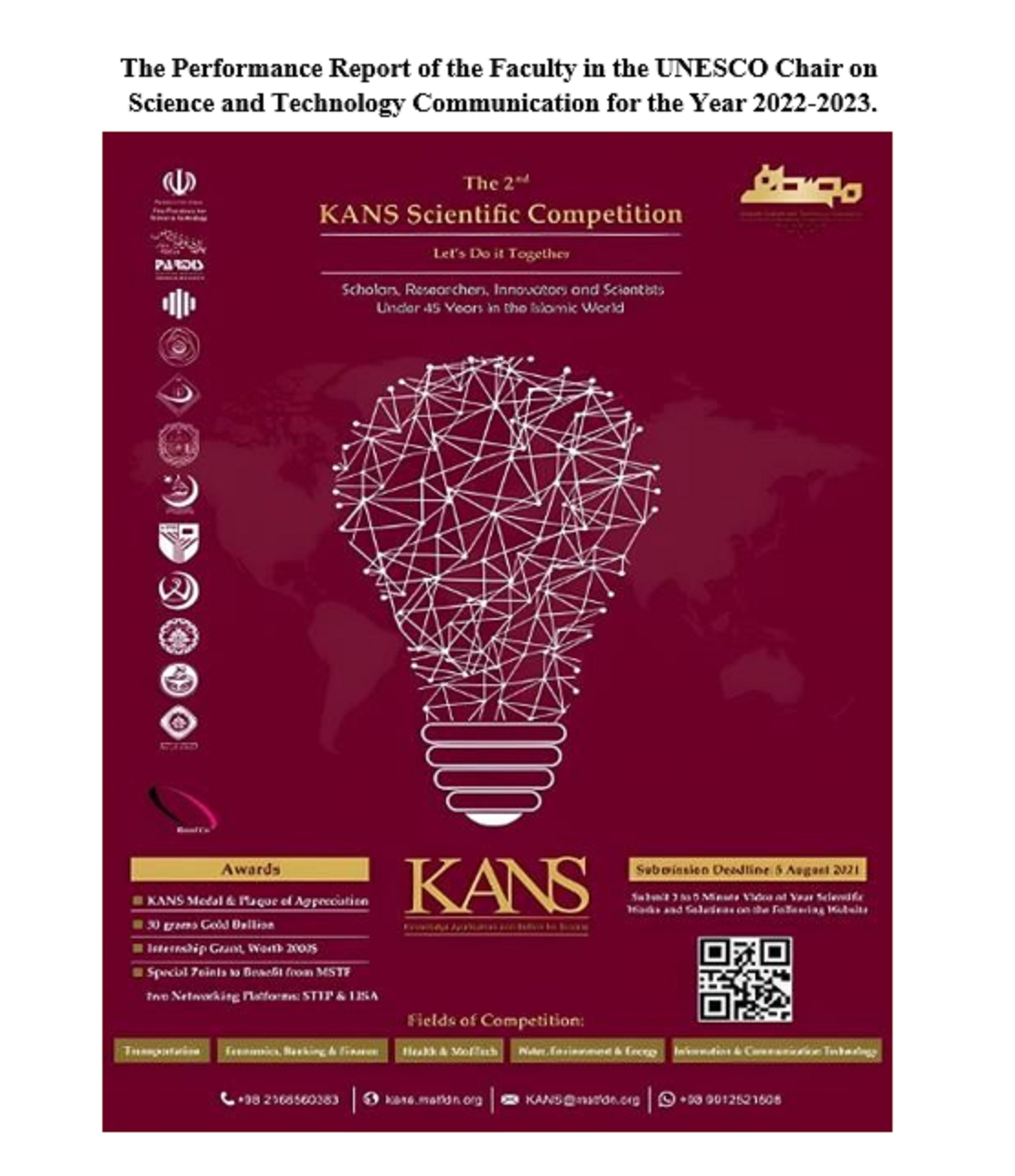
The KANS Scientific Competition (Knowledge Application and Notion for Society) is a prestigious event organized under the auspices of the Mustafa Science and Technology Foundation (MSTF). It is designed to encourage innovation scientific research and problem-solving among scholars researchers innovators and scientists under the age of 45 from the Islamic World. With its goal to address global challenges and foster collaboration KANS has become a platform for empowering young minds and promoting solutions that have a tangible impact on society.
The KANS Scientific Competition is structured as an international platform to bridge the gap between scientific innovation and societal application. It seeks to identify and reward outstanding contributions in areas critical to sustainable development and global progress. By focusing on innovation and interdisciplinary research KANS aims to strengthen the role of science and technology in addressing global challenges.
The initiative targets young talents in the Islamic world leveraging their ideas and innovations to create solutions for contemporary issues. Participants are required to submit a 3 to 5-minute video presentation summarizing their projects or research findings. This format ensures accessibility practicality and efficient evaluation by a distinguished panel of judges.
Encouraging Innovation KANS emphasizes the importance of innovation in science and technology to address societal challenges. By bringing together researchers and innovators from across the Islamic world it fosters collaboration and knowledge-sharing. The competition provides a platform for young scientists to showcase their talents and contribute to the scientific progress of their communities. It prioritizes projects that have a direct impact on health technology the environment and economic systems.
The competition highlights five crucial areas that align with pressing global needs and sustainable development goals. Health and Medical Technology (MedTech) includes innovations in healthcare delivery medical devices and public health solutions. Water Environment and Energy focuses on issues such as renewable energy climate change and efficient resource management. Information and Communication Technology (ICT) emphasizes projects in artificial intelligence big data cybersecurity and digital solutions. Transportation highlights innovations aimed at improving transportation systems for sustainability and efficiency. Economics Banking and Finance targets solutions for financial inclusivity economic growth and innovative approaches in banking systems. These fields represent areas where science and technology can drive transformative change particularly in regions facing resource constraints and development challenges.
To incentivize participation and celebrate excellence KANS offers multiple awards. The KANS Medal and Plaque of Appreciation symbolize recognition for outstanding contributions. 30 Grams of Gold Bullion serves as a tangible and prestigious reward for the top performers. Internship Grants Worth $2000 provide opportunities for winners to engage in professional development and further refine their projects. Participants also gain special access to networking platforms like STIP (Science and Technology Information Platform) which facilitates collaboration among scientists and innovators and IISA (Islamic Innovation and Scientific Application Network) a global community that connects researchers for joint projects and partnerships. These rewards not only
provide financial incentives but also open doors for further opportunities in research development and professional growth.
Participants are required to submit a concise video presentation summarizing their ideas projects or research findings. The videos are evaluated by an esteemed panel of judges based on originality and innovation the novelty and creativity of the proposed solution societal impact the potential of the project to address real-world problems effectively feasibility and implementation the practicality of translating the idea into action and interdisciplinary approach where projects that integrate multiple fields of knowledge are highly valued. The submission deadline for the 2nd competition was August 5 2021 and this cycle attracted numerous participants from diverse academic and professional backgrounds.
The KANS Scientific Competition is organized by the Mustafa Science and Technology Foundation (MSTF) a prominent organization dedicated to promoting scientific excellence within the Islamic world. MSTF is known for its commitment to advancing science technology and innovation through programs like the Mustafa Prize and various networking platforms. The competition is supported by academic institutions research centers and international organizations making it a collaborative effort that extends beyond borders.
The KANS Scientific Competition aligns with UNESCO's goals and the United Nations Sustainable Development Goals (SDGs) focusing on sustainable development encouraging innovations that promote environmental sustainability renewable energy and resource efficiency global health addressing healthcare challenges through advancements in medical technology and public health solutions technological growth supporting digital transformation and the adoption of ICT in underserved regions economic development fostering innovation in financial systems to promote economic stability and growth. By targeting these areas the competition contributes to addressing global issues while highlighting the scientific potential of the Islamic world.
A key aspect of the KANS competition is its emphasis on networking and collaboration. The platforms provided STIP and IISA enable participants to access resources and research opportunities connect with peers mentors and industry leaders and collaborate on interdisciplinary projects that have global relevance. These platforms act as catalysts for building long-term relationships among researchers and innovators fostering a sense of community and shared purpose.
As the competition evolves its organizers aim to expand participation increase the number of participants by reaching more countries within the Islamic world and beyond promote inclusivity ensure greater representation of women and underrepresented groups in science and technology focus on emerging challenges address new and emerging global challenges such as climate resilience AI ethics and pandemic preparedness and strengthen partnerships collaborate with more international organizations and academic institutions to amplify its impact. By pursuing these goals KANS seeks to remain at the forefront of scientific innovation and collaboration.
The KANS Scientific Competition is a vital initiative that recognizes and nurtures young talent while addressing critical societal challenges. By focusing on innovation collaboration and impact
it serves as a beacon of hope for the Islamic world showcasing the transformative power of science and technology in improving lives and building a sustainable future.
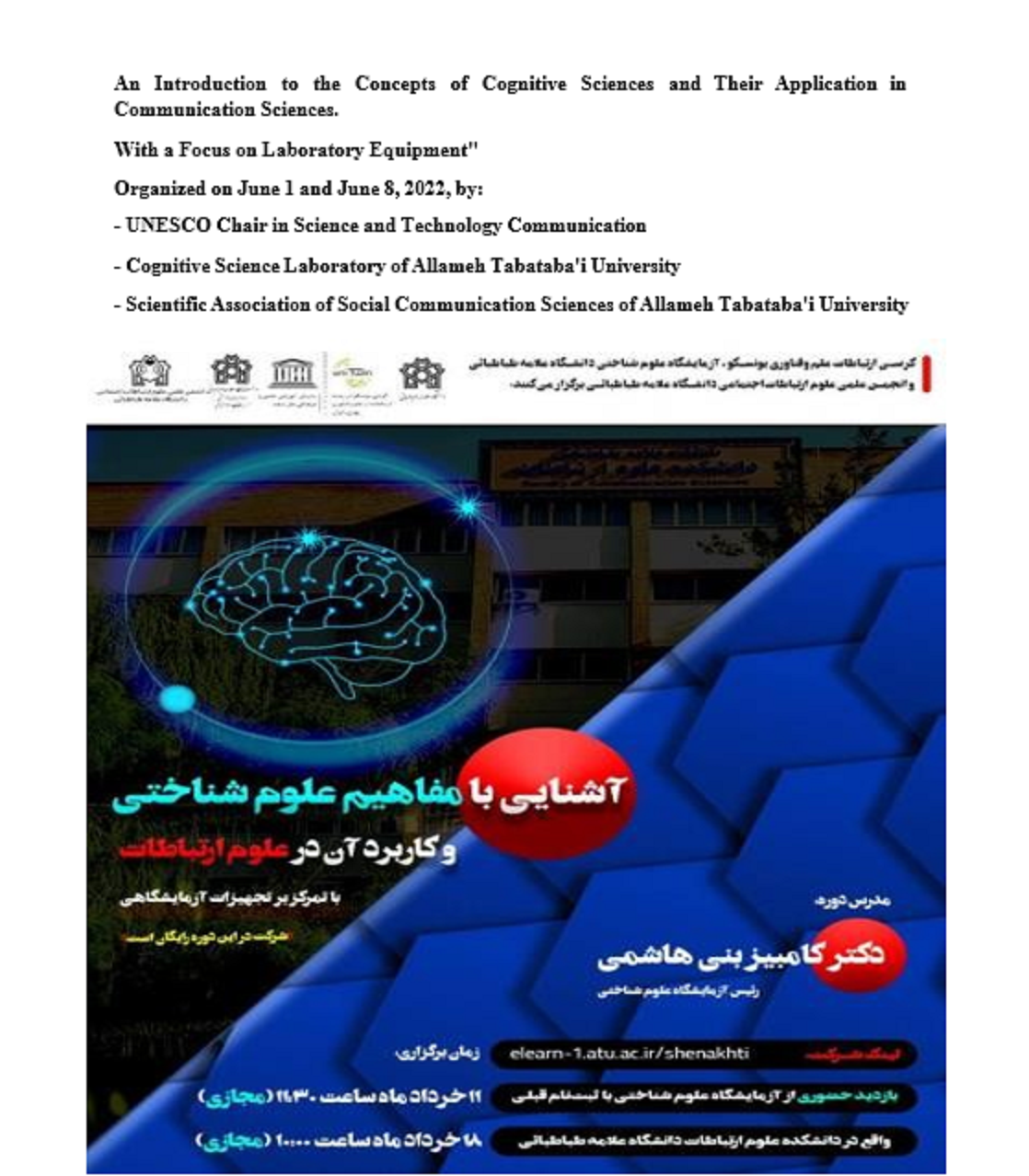
The course titled "Introduction to Cognitive Science Concepts and Their Applications in Communication Sciences" was recently organized by the UNESCO Chair on Communication of Science and Technology in collaboration with Allameh Tabataba’i University (ATU). This educational event aimed to enhance participants' understanding of the intersections between cognitive science and communication disciplines, particularly through theoretical and practical exposure to cognitive science methodologies and technologies.
The course was held in a hybrid format, combining online and in-person sessions over three sessions. The first two sessions were conducted virtually, providing participants with foundational knowledge on cognitive science concepts. The final session took place in person, offering a unique opportunity for attendees to visit the university's Cognitive Science Laboratory. During this session, participants explored state-of-the-art laboratory equipment and gained practical insights into how cognitive science tools, such as brain activity monitors and neuroimaging devices, can be applied in communication research.
Dr. Kambiz Bani-Hashemi, the head of the Cognitive Science Laboratory at ATU, served as the instructor for the course. With his extensive expertise in the field, Dr. Bani-Hashemi delivered engaging lectures on topics ranging from cognitive neuroscience to the application of experimental techniques in understanding human communication processes. His lectures emphasized the importance of integrating cognitive insights into communication studies to advance the field and tackle real-world challenges in media and interpersonal communication.
The course attracted a diverse group of attendees, including graduate students, researchers, and communication professionals. Participants appreciated the comprehensive approach of the program, which combined theoretical learning with hands-on experiences. The inclusion of the laboratory visit was particularly praised for its interactive nature, allowing attendees to connect theoretical knowledge with practical applications.
This initiative aligns with the goals of the UNESCO Chair, which seeks to promote interdisciplinary research and education in science communication. By bridging the gap between cognitive science and communication studies, the course fostered a deeper understanding of how cognitive processes influence human interactions and information dissemination. Such insights are crucial in an era where effective communication is key to addressing complex societal challenges.
The program was made accessible to participants free of charge, reflecting the organizers' commitment to promoting education and research in cognitive and communication sciences. The collaboration between the UNESCO Chair and ATU highlights the university's leadership in fostering innovation and interdisciplinary learning within the region.
Overall, the course on cognitive science and communication was a significant step toward expanding the horizons of communication studies through cognitive science perspectives. It not only provided participants with valuable academic and professional skills but also underscored the importance of interdisciplinary approaches in tackling contemporary issues in communication and beyond.
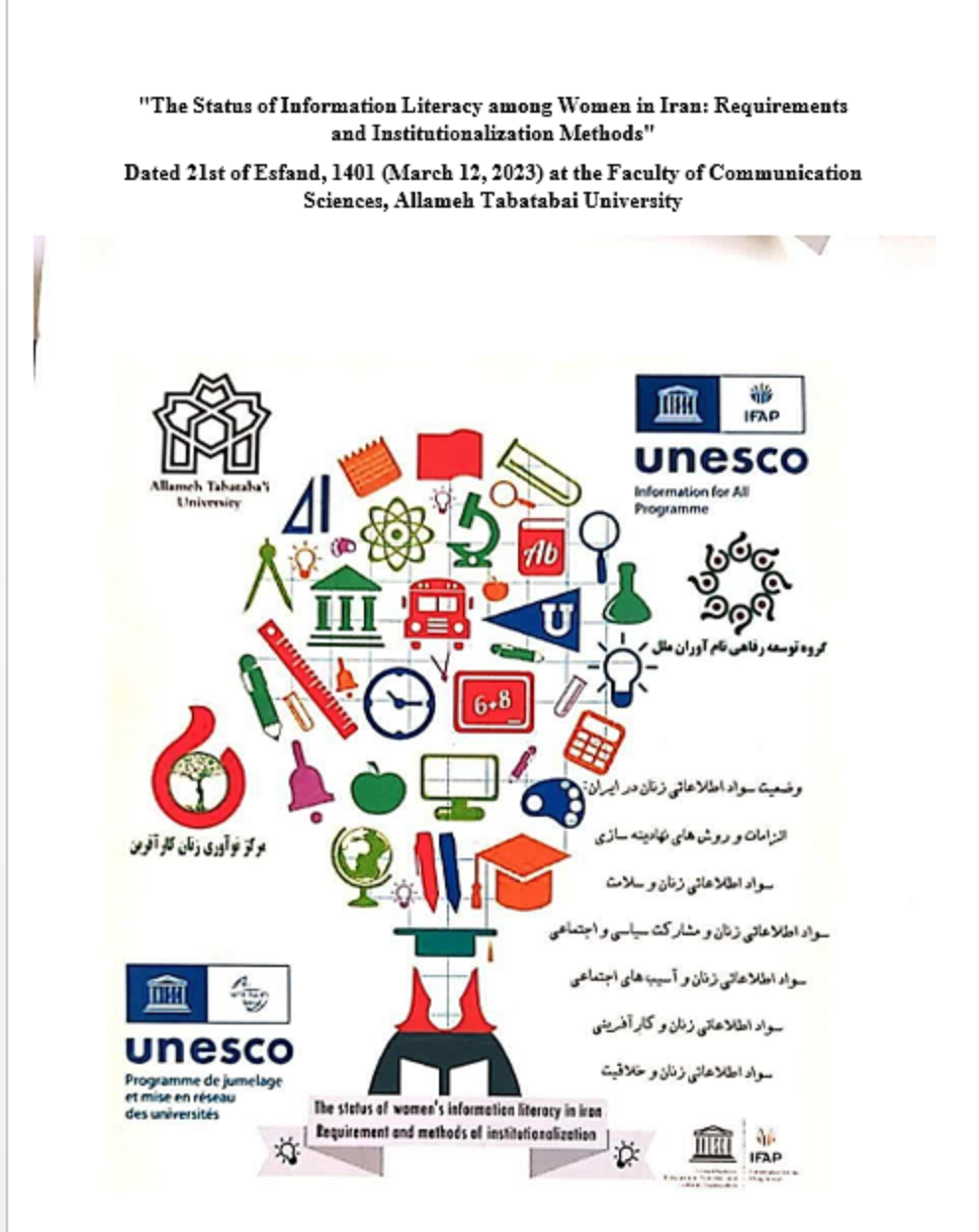
The " The Status of Information Literacy among Women in Iran: Requirements and Institutionalization Methods " (IFAP) by UNESCO, in collaboration with Allameh Tabataba’i University in Tehran, has launched a groundbreaking initiative focusing on women's information literacy in Iran. This project, titled "The Status of Women’s Information Literacy in Iran: Requirements and Methods of Institutionalization," seeks to empower women by addressing the systemic barriers that hinder their access to and use of information. This initiative is part of UNESCO’s global commitment to gender equality, aligned with its Sustainable Development Goals (SDGs), particularly in fostering inclusive and equitable quality education and promoting lifelong learning opportunities.
The initiative encompasses six key domains related to women’s information literacy. These include health literacy, which helps women make informed decisions about their health; social participation literacy, aimed at increasing their civic engagement; and entrepreneurial literacy, which focuses on equipping women with tools to innovate and contribute to economic growth. Other areas include literacy for mitigating social risks, creativity literacy to foster cultural contributions, and frameworks for institutionalizing these capacities in education and public policy.
One of the primary goals of the project is to bridge the digital divide that often marginalizes women, particularly in rural and underprivileged areas. It highlights the importance of digital tools and resources in modern education systems, enabling women to engage effectively in a rapidly evolving information-driven society. Workshops, seminars, and collaborative research form the core of this initiative, engaging stakeholders from academia, government, and civil society to create a sustainable model for the institutionalization of women’s information literacy.
This program has also brought attention to the broader societal impacts of empowering women with information literacy. Studies associated with the project underscore how enhanced access to information enables women to actively participate in governance, entrepreneurship, and community leadership. By targeting specific societal challenges, such as misinformation and lack of digital access, the initiative offers actionable solutions that benefit not only women but society as a whole.
UNESCO's role in this project is significant, as it provides a platform for collaboration among international experts, policymakers, and local organizations. The program aligns with UNESCO’s global efforts to advocate for equitable access to information as a fundamental human right. It reinforces the organization’s mission to eliminate gender disparities in education and empower marginalized groups through knowledge and capacity-building initiatives.
Through the leadership of Allameh Tabataba’i University, the project has successfully engaged Iranian scholars and practitioners in dialogue and action. By emphasizing the institutionalization of women’s information literacy programs, the initiative is laying the groundwork for long-term societal transformation. The university’s dedication to academic excellence and social progress further amplifies the impact of the project, making it a model for similar initiatives in other regions.
This initiative highlights the critical role of information literacy in addressing gender inequalities and underscores the importance of collective action in creating sustainable solutions. As UNESCO
and its partners continue to build on these efforts, this program serves as a beacon of hope for advancing gender equality in Iran and beyond.
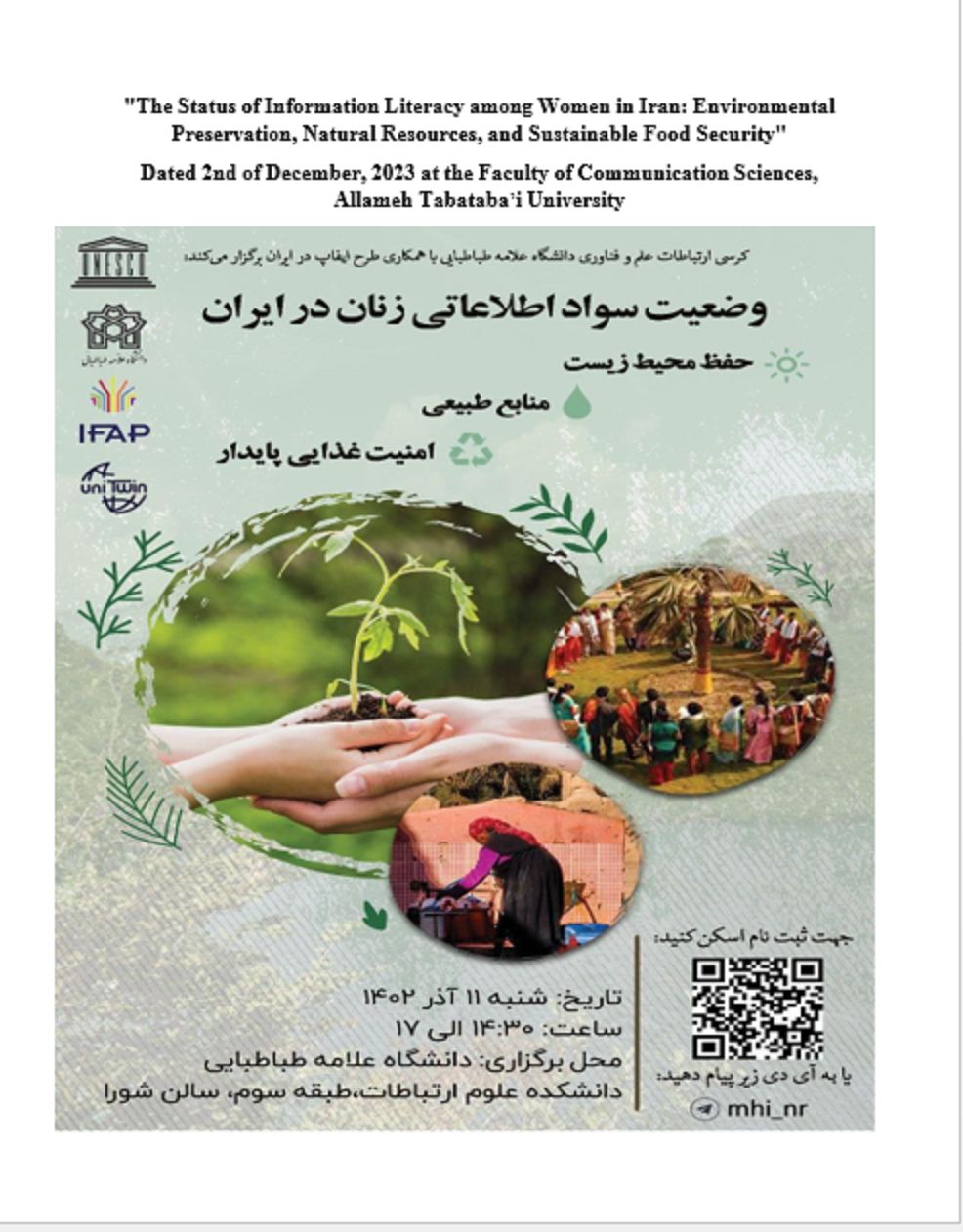
The conference titled "Women's Information Literacy in Iran" is scheduled for December 1, 2024, and will be held at Allameh Tabataba’i University in Tehran. Organized by the university's Faculty of Communication Sciences in collaboration with UNESCO's Information for All Programme (IFAP), this event addresses critical themes related to empowering women through information literacy. The initiative focuses on environmental preservation, sustainable food security, and the efficient management of natural resources, aiming to highlight the vital role women play in fostering sustainable development.
The program underscores the importance of equipping women with skills to access, interpret, and apply information to address socio-environmental challenges effectively. By promoting information literacy, the event seeks to empower women as key contributors to the sustainable management of environmental and socio-economic systems. Discussions are expected to explore strategies for environmental conservation, innovative approaches to resource management, and methods for enhancing food security through sustainable practices. This reflects the growing recognition of women’s potential as agents of change in tackling global challenges, particularly in the context of the United Nations Sustainable Development Goals.
This conference aligns with Iran's commitment to fostering educational equity and advancing literacy, especially among women, as part of broader global efforts. It builds upon previous initiatives under UNESCO’s framework to enhance access to knowledge and digital inclusion. Participants will include academics, practitioners, policymakers, and other stakeholders interested in gender empowerment, sustainability, and education. By fostering dialogue and collaboration, the event aims to develop actionable insights and practical recommendations for institutionalizing women’s information literacy within the framework of environmental and socio-economic development.
For registration and additional details, attendees are encouraged to visit the event's official platform, which provides comprehensive information on the program, its objectives, and how to participate. This initiative not only reflects the university's leadership in advancing interdisciplinary research but also contributes to global efforts toward achieving inclusive and sustainable progress.
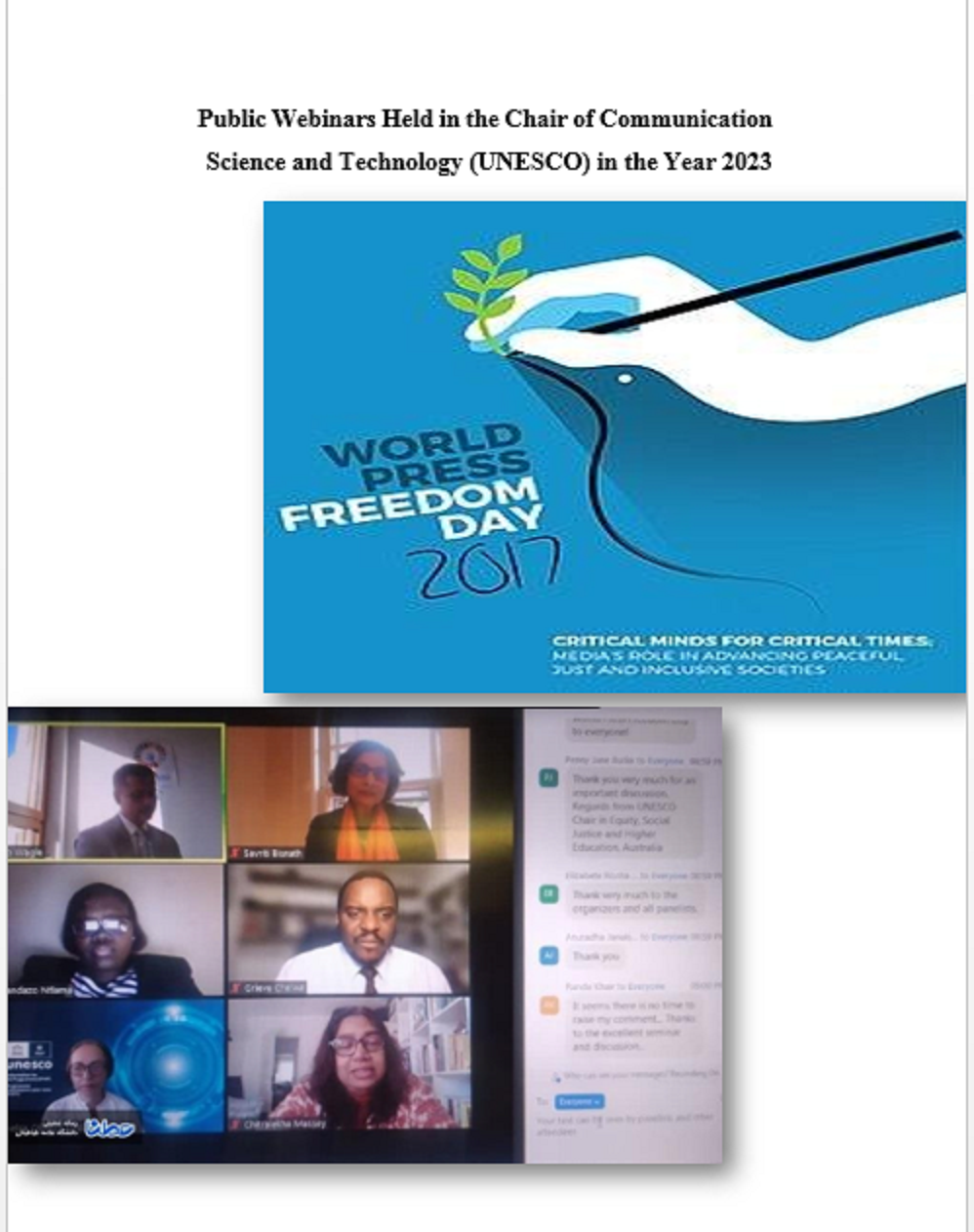
The webinar titled "The Role of Science in Society and the Accessibility to Scientific Knowledge," hosted by the UNESCO Chair on Science Communication and Technology at Allameh Tabatabai University, served as a platform to discuss critical issues related to the dissemination and equitable access to scientific knowledge. This event, held in partnership with UNESCO, emphasized the transformative potential of science in fostering societal well-being and addressing global challenges. The discussions reflected on how academic institutions, policymakers, and international organizations can collectively uphold the ethical imperative of making science accessible to all.
The webinar was attended by prominent figures, including Dr. Ali Asghar Kia, Chair of the UNESCO Science Communication and Technology Chair, and experts from diverse fields, reflecting the interdisciplinary nature of the discussions. The event focused on exploring strategies to address barriers to accessing scientific knowledge, particularly in underserved and marginalized communities. Participants highlighted the growing digital divide and the need for reforms in intellectual property regulations to enable broader dissemination of scientific findings.
The session began with opening remarks emphasizing the importance of aligning scientific progress with ethical and social responsibility. The speakers underscored how science has historically driven human progress but cautioned against the inequities in its benefits. They discussed the role of public policies in ensuring that advancements in fields like renewable energy, healthcare, and education are accessible globally.
Dr. Kia highlighted the role of open-access initiatives in democratizing scientific knowledge. He called for increased investment in digital infrastructures to bridge the digital divide, which continues to exclude significant populations from participating in and benefiting from scientific advancements. He also stressed the importance of public engagement in science to cultivate a society that values and supports scientific inquiry.
The webinar also showcased case studies illustrating how inclusive science policies can drive social and economic transformation. Examples included community-driven renewable energy projects and open-access healthcare research initiatives that have empowered local populations to address pressing challenges. Participants explored how these models could be replicated in other regions to ensure more equitable outcomes.
In a panel discussion, experts from UNESCO shared insights into international frameworks promoting the right to access science. They emphasized the significance of implementing the recommendations outlined in UNESCO's "Recommendation on Science and Scientific Researchers," which underscores the rights and responsibilities of researchers in contributing to the public good.
The discussions concluded with actionable recommendations. These included advocating for open- access publishing models, strengthening collaborations between academic institutions and international organizations, and increasing investment in scientific education to enhance literacy and foster public trust in science. The participants also highlighted the need for interdisciplinary research and policy-making to ensure science serves diverse societal needs effectively.
This webinar served as a crucial reminder of the role of science in addressing the world's most pressing challenges and the ethical imperative of ensuring it is accessible to all. By fostering dialogue among stakeholders, it underscored the shared responsibility of the global community to uphold the principles of inclusivity and equity in the scientific domain.
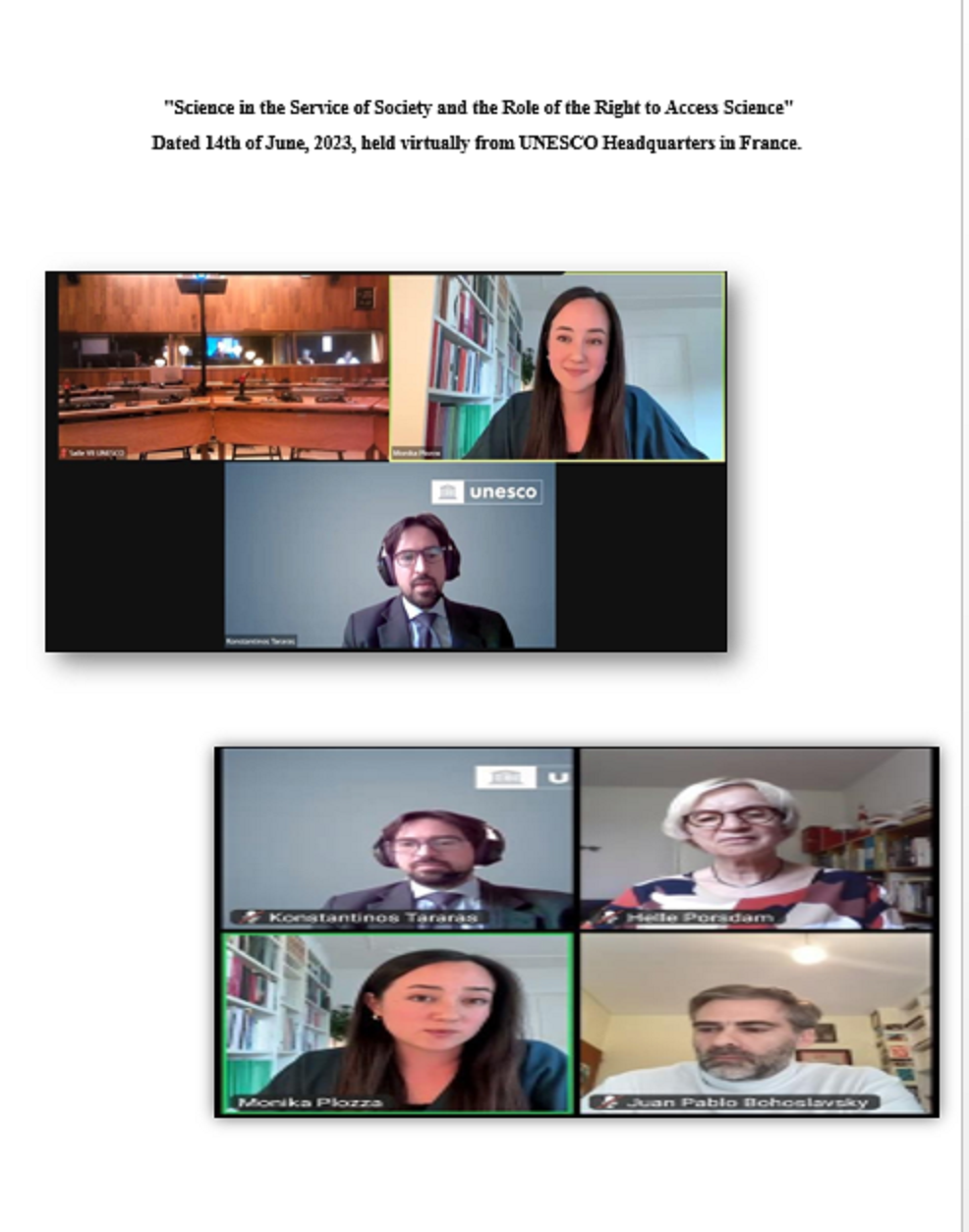
Science in the Service of Society The Role of the Right to Access Science
The fifth webinar hosted by the UNESCO Chair on Science Communication and Technology at Allameh Tabatabai University on June 14, 2023, titled "Science in Service of Society and the Role of the Right to Access Science" presented a comprehensive discourse on the ethical, social, and institutional imperatives of ensuring public access to scientific knowledge. This event held virtually from UNESCO's headquarters in France aimed to mobilize interdisciplinary expertise to explore strategies for embedding science into societal frameworks to combat global inequalities and foster sustainable development.
The Purpose and Context of the Webinar
This webinar was designed to address the fundamental question How can science serve society more effectively while ensuring equitable access to its fruits? Access to scientific knowledge is not only a human right but also a critical enabler of societal advancement. The session underscored the importance of open access to science in fostering innovation enabling education and tackling challenges like climate change public health crises and technological disparities.
Prominent experts including Dr. Ali Asghar Kia Chair of the UNESCO Science Communication Chair and international representatives such as Angela Melo Director of UNESCO’s Division for Social and Human Sciences contributed to this critical dialogue. They emphasized the necessity of collaborative and interdisciplinary approaches to science policy to mitigate inequalities and promote inclusivity.
Science as a Pillar of Society
Science has been the backbone of societal progress shaping industries governance healthcare and education. However the benefits of scientific advancements are not evenly distributed across societies. Disparities in access to knowledge exacerbate socio-economic divides leaving underprivileged populations vulnerable to issues like disease food insecurity and climate disasters.
The webinar illustrated how science plays a vital role in
• Public Health Innovations in medicine such as vaccines have demonstrated how science can safeguard human life. During the COVID-19 pandemic rapid vaccine development exemplified the value of international scientific collaboration.
• Sustainability Scientific advancements in renewable energy and climate adaptation are essential to addressing environmental challenges. Access to these innovations ensures that even developing nations can partake in global sustainability efforts.
• Education and Empowerment Scientific literacy empowers individuals to make informed decisions fostering critical thinking and civic engagement.
Ethical Imperatives and the Right to Access
The webinar emphasized that access to science is not merely a privilege but a human right recognized by international frameworks including the Universal Declaration of Human Rights and UNESCO’s Recommendation on Science and Scientific Researchers. However barriers such as high publication costs technological divides and restrictive intellectual property laws hinder equitable access to scientific knowledge.
Speakers proposed solutions like open access publishing knowledge sharing platforms and policy reforms to bridge these gaps. Dr. Kia highlighted that enabling access to science is pivotal for addressing societal inequalities and ensuring that science remains a public good.
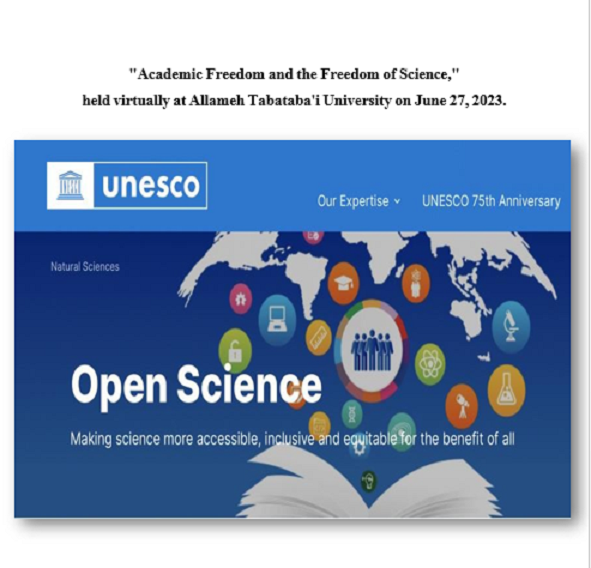
The webinar titled "Academic Freedom and the Freedom of Science" held virtually on June 27 2023 at Allameh Tabataba'i University provided a platform for academics and experts to discuss the significance of freedom in scientific research and academic expression. Organized under the auspices of the UNESCO Chair on Science Communication and Technology the event emphasized the intrinsic link between academic freedom and the advancement of knowledge. The discussions underscored how safeguarding these freedoms contributes to societal development innovation and the resolution of global challenges.
Academic freedom and freedom of science are pivotal principles that ensure researchers and scholars can pursue their inquiries without undue interference or restriction. These concepts empower institutions to operate autonomously while fostering environments conducive to critical thinking and innovation. The webinar brought together diverse voices including university leaders policymakers and scholars to reflect on the current state of these freedoms and the challenges faced in various contexts particularly in developing nations.
The session began with opening remarks from key organizers who highlighted the historical and ethical significance of academic freedom. It was noted that this principle is enshrined in several international agreements and declarations including UNESCO's Recommendation on Science and Scientific Researchers. However despite its formal recognition participants acknowledged that academic freedom is increasingly under threat due to political interference financial constraints and the growing corporatization of universities.
One of the central themes of the discussion was the impact of external pressures on academic institutions. Speakers shared examples of how political and economic factors influence research priorities often diverting resources away from fundamental science toward commercially driven projects. They stressed that while collaboration with industry is important it should not compromise the independence of academic inquiry or the pursuit of knowledge for the public good.
The role of universities as guardians of intellectual freedom was another focal point of the discussions. Participants emphasized that institutions must actively resist pressures that undermine their autonomy. They highlighted the importance of transparent governance structures and the active involvement of faculty in decision-making processes to uphold these principles. The discussions also called attention to the need for universities to serve as spaces for open dialogue and dissent where diverse viewpoints can be explored without fear of reprisal.
The webinar also addressed the global dimension of academic freedom. While acknowledging that challenges vary across regions participants noted commonalities such as restrictions on academic mobility and the censorship of politically sensitive research. International collaborations were identified as critical mechanisms for promoting and protecting academic freedom. By fostering partnerships between institutions in different countries researchers can build networks of support and share strategies for navigating restrictive environments.
Another key aspect of the discussions was the intersection of academic freedom with broader human rights frameworks. The speakers highlighted that academic freedom is not only about the rights of scholars but also about the rights of society to access unbiased and high-quality
information. This perspective aligns with the principle of freedom of science which advocates for the dissemination of scientific knowledge as a public good.
The webinar also featured case studies illustrating the consequences of eroding academic freedom. These examples highlighted how restrictions on research and teaching can stifle innovation limit public access to knowledge and hinder progress on critical issues such as climate change and public health. The participants called for stronger protections against censorship and greater accountability for institutions that fail to uphold these values.
A notable segment of the event was dedicated to exploring the role of digital technology in advancing academic freedom. While acknowledging the potential of digital platforms to democratize access to knowledge speakers also warned of the risks posed by surveillance misinformation and the monopolization of information by tech giants. They stressed the need for robust digital policies that safeguard the privacy and independence of researchers while ensuring equitable access to resources.
The event concluded with a set of recommendations aimed at reinforcing academic freedom and the freedom of science. These included advocating for legal protections at the national and international levels increasing funding for independent research and fostering a culture of accountability within academic institutions. Participants also emphasized the importance of public awareness campaigns to highlight the value of these freedoms for society at large.
By bringing together experts from diverse backgrounds the webinar provided a comprehensive overview of the challenges and opportunities associated with academic freedom and the freedom of science. It highlighted the need for a concerted effort from all stakeholders universities governments international organizations and civil society to ensure that these principles remain integral to the pursuit of knowledge and societal progress.
The discussions from this event serve as a valuable resource for understanding the complex dynamics of academic freedom in the modern era and offer actionable insights for protecting and promoting these essential values.

The webinar titled "Deployment of Renewable Energy at a Large Scale for Climate Change Mitigation" was held virtually on July 10, 2023, at Allameh Tabataba'i University. The event provided an important platform for discussing the role of renewable energy in mitigating climate change. The discussions focused on the challenges, opportunities, and strategies for scaling up renewable energy production to meet the growing energy demands while reducing the environmental impact of traditional energy sources.
The session began with an introduction to the global energy crisis and the urgent need for transition to renewable sources to combat climate change. Experts highlighted that renewable energy technologies such as solar, wind, hydroelectric, and geothermal are essential for reducing greenhouse gas emissions, which are the primary drivers of global warming. The speakers emphasized that large-scale adoption of these technologies is crucial for achieving international climate targets, such as those outlined in the Paris Agreement.
One of the key topics addressed during the webinar was the technical feasibility of large-scale renewable energy deployment. Several experts discussed how advances in technology have made renewable energy sources more efficient and cost-competitive with fossil fuels. They pointed to examples of countries that have successfully integrated renewable energy into their national grids and achieved significant reductions in carbon emissions. These success stories served as models for other nations seeking to transition to cleaner energy.
However, the discussion also highlighted several barriers to large-scale deployment. One of the primary challenges identified was the intermittent nature of renewable energy sources such as solar and wind. Since these sources are not available consistently throughout the day or year, energy storage solutions are necessary to ensure a reliable energy supply. Experts discussed the potential of emerging storage technologies like batteries and pumped hydro storage to address this issue and make renewable energy more reliable.
Another challenge raised during the session was the infrastructure required for large-scale renewable energy projects. Building the necessary infrastructure such as transmission lines, power plants, and energy storage facilities requires substantial investment. Moreover, the need for smart grid technologies that can manage the variable supply of renewable energy was emphasized. The speakers noted that overcoming these infrastructural challenges is critical to ensuring the widespread deployment of renewable energy.
The webinar also touched on the economic and policy dimensions of renewable energy deployment. Participants discussed how governments can incentivize investment in renewable energy through subsidies, tax incentives, and regulations that encourage the development of clean energy technologies. The role of international cooperation in promoting renewable energy was also emphasized. Many speakers noted that climate change is a global issue and that international collaboration is essential for achieving large-scale renewable energy deployment.
In addition to discussing the benefits and challenges of renewable energy, the webinar also explored the social and environmental impacts of transitioning to clean energy. Several experts highlighted that renewable energy projects can create jobs and contribute to local economic development. However, the social implications of large-scale renewable energy projects,
particularly in rural areas, were also discussed. Speakers emphasized the importance of engaging local communities in the planning and development of renewable energy projects to ensure that they benefit from the transition to clean energy.
The webinar concluded with a set of recommendations for advancing large-scale renewable energy deployment. These included increasing research and development into new renewable energy technologies, expanding investment in energy storage solutions, and improving the regulatory environment to support the growth of clean energy markets. The participants also called for greater public awareness of the importance of renewable energy and the role it plays in mitigating climate change.
The discussions provided valuable insights into the complex issues surrounding renewable energy deployment and its role in addressing climate change. The event emphasized that while significant progress has been made, more needs to be done to accelerate the transition to a sustainable energy future. By fostering dialogue between experts, policymakers, and the public, the webinar highlighted the importance of collaborative efforts in ensuring a cleaner, more sustainable world for future generations.

The specialized seminar organized by the UNESCO Chair at Allameh Tabataba’i University focused on the significance of human-centered knowledge sciences and technology in promoting deep active and continuous learning. This seminar was part of the preparatory activities for the international event titled the Summit of the Future which is a global initiative led by the United Nations to address current global challenges while planning for future uncertainties.
The seminar was held virtually on March 5 2024 and was attended by Dr. Ali Asghar Kia the Chair of the UNESCO Communication of Science and Technology program alongside other scholars and experts from various UNESCO member states including Iran Italy Spain France Brazil Canada Egypt and India. The discussions revolved around the agenda and primary themes of the Summit of the Future emphasizing the necessity for maximum multilateral collaboration among governments private sector representatives and global civil society actors to achieve a collective future.
The Summit of the Future is envisioned as a platform to bring global leaders together to establish an international consensus on implementing optimized solutions that enhance the current experience for humanity while mitigating risks for the future. It seeks to demonstrate how effective multilateral international cooperation can tackle today’s pressing challenges and anticipate future obstacles. A central focus of the seminar was the discussion of the Pact for the Future which is a document outlining a comprehensive framework of commitments and solutions that will be negotiated and finalized during the summit scheduled for September 2024.
The proposed Pact for the Future highlights key areas such as sustainable development and financing international peace and security science technology and digital innovation youth and future generations and transforming global governance systems. The seminar participants emphasized the importance of understanding current challenges holistically and collaboratively to develop sustainable strategies that benefit future generations. These strategies are expected to be formalized into action plans during the upcoming summit.
This global event aims to accelerate ongoing international efforts and take concrete steps to address both immediate and emerging global issues. Through the design negotiation and adoption of the Pact for the Future the summit will strive to achieve significant progress in tackling global challenges while fostering a shared commitment to long-term resilience and inclusivity.
Further information about the Summit of the Future and the zero draft of the Pact for the Future is accessible through the official website of the United Nations at Summit of the Future.
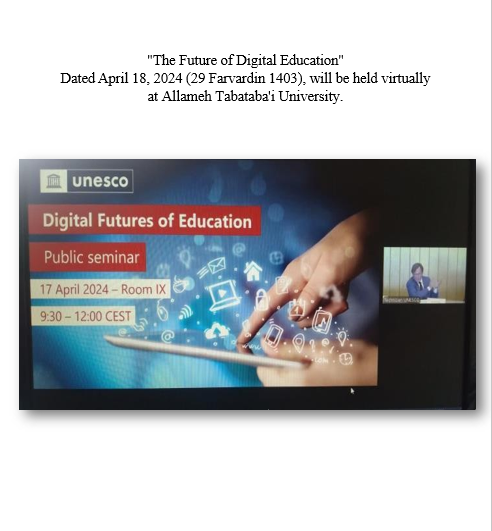
On April 17, 2024, UNESCO hosted the public seminar titled Digital Futures of Education at its headquarters in Room IX, gathering over 300 participants both in-person and online. The seminar served as a pivotal event to explore strategies for leveraging digital technologies, particularly artificial intelligence, in creating inclusive, human-centered, and resilient education systems. This initiative aligns with UNESCO’s commitment to Sustainable Development Goal 4 (SDG4), promoting equitable and quality education for all.
Simultaneously, on April 29, 2024, Allameh Tabataba’i University in Iran held a virtual seminar under the same theme, discussing the transformative potential of digital technologies in education. This session focused on adapting global insights from UNESCO’s initiatives to the local Iranian context, emphasizing the importance of digital equity and inclusion in educational reforms. Experts highlighted the critical role of policies and technologies, such as the Technology-Enabled Open Schools for All System (TeOSS) project, which aims to modernize education through digital platforms and teacher training. They also reflected on the progress achieved in countries like Ghana, Brazil, and Thailand under the first and second phases of the TeOSS project, setting benchmarks for integrating national curriculums with advanced digital solutions.
The discussions at Allameh Tabataba’i University complemented the broader narrative presented at UNESCO, shedding light on the shared global challenges of accessibility, sustainability, and inclusivity in digital education. By connecting local and international perspectives, the seminar in Iran highlighted how universities could act as catalysts in advancing digital literacy and fostering innovative educational practices that resonate with diverse cultural and regional needs.
Both events underscore the growing momentum of digital transformation in education, showcasing the potential of collaborative efforts between UNESCO and national institutions to bridge educational disparities and prepare for a more connected and inclusive future.
Conclusion:
Core Objectives
1. Enhancing Scientific Literacy
The Chair's foremost goal is to improve public understanding of science and technology. Scientific literacy empowers individuals to make informed decisions about personal, societal, and global challenges. This involves:
• Simplifying complex scientific concepts for diverse audiences.
• Designing educational resources and campaigns tailored to specific societal needs, such as environmental conservation or public health.
• Collaborating with schools and universities to develop curricula that emphasize the role of science in daily life.
2. Bridging Science and Society
The Chair aims to create platforms for direct interaction between scientists, policymakers, and the public. By fostering dialogue, it seeks to build trust and transparency in scientific endeavors. Key initiatives include:
• Hosting public seminars and workshops where researchers can explain their work to non- specialists.
• Encouraging participatory approaches, such as citizen science projects, where communities contribute to research and benefit from its outcomes.
• Addressing societal concerns, such as the ethical implications of artificial intelligence or biotechnology, through inclusive discussions.
3. Promoting Ethical Practices in Technology
In the face of rapid technological advancements, ethical considerations are paramount. The Chair actively explores topics like:
• Data privacy and the implications of artificial intelligence on employment and decision- making.
• Responsible innovation in fields like genetics, digital technology, and renewable energy.
• Establishing guidelines that balance technological growth with societal values and needs.
Key Initiatives and Activities Research and Development
Interdisciplinary research is at the heart of the Chair’s efforts. Its projects often combine insights from communication sciences, humanities, and technology to tackle pressing issues. Recent studies have explored:
• The role of media in enhancing health literacy during global crises like the COVID-19 pandemic.
• Public attitudes toward AI and its ethical implications, aiming to guide policy and innovation practices.
Education and Capacity Building
The Chair provides training programs to equip scientists, educators, and policymakers with effective communication skills. These programs include:
• Workshops for researchers on simplifying their findings for general audiences.
• Seminars for educators to integrate science communication into their teaching methods.
• Collaborative projects with policymakers to ensure science-based decision-making.
Public Engagement
Through interactive events like science festivals and digital campaigns, the Chair seeks to make science accessible and engaging. These activities:
• Utilize storytelling and visual tools to demystify scientific concepts.
• Foster two-way communication between experts and the public.
• Encourage societal involvement in scientific discussions, ensuring that innovations align with community needs.
Collaboration and Global Impact Local Outreach
The Chair partners with local organizations and governments to address regional challenges. Examples include:
• Campaigns to promote water conservation in Iran’s arid regions.
• Projects that address air pollution and sustainable urban development.
Global Partnerships
As part of the UNESCO network, the Chair collaborates with other institutions worldwide to share knowledge and best practices. Its contributions to international dialogues on sustainability and ethical technology have made it a significant player in global science communication initiatives.
Future Goals
The Chair is dedicated to expanding its influence by:
• Exploring the integration of behavioral sciences with communication technologies to enhance public engagement.
• Developing AI-driven tools for real-time analysis of public perceptions and tailoring communication strategies accordingly.
• Strengthening its focus on sustainability, particularly in areas like climate change and renewable energy, to address global challenges effectively.
Acknowledgment and Gratitude
I would like to express my sincere gratitude to all the colleagues at the UNESCO Chair on Communication of Science and Technology at Allameh Tabataba'i University for their dedication and exceptional collaboration. Your hard work and unwavering commitment have been instrumental in advancing our shared mission.
I also want to extend a special thanks to Mr. Ali Asgari, a political science student, and Mr. Mohammad Mahmoudi Khatoon Abadi, a law student, for their invaluable contributions to the project. Your efforts and enthusiasm have truly enriched this endeavor, and I am deeply appreciative of your dedication.
Thank you all once again for your cooperation and hard work.
Dr. Ali Asghar Kia
RF:
ATU's Official Website for UNESCO Chair: Details about the UNESCO Chair on Communication of Science and Technology at Allameh Tabataba'i University were taken from the official ATU website: uccst.atu.ac.ir
Wikipedia
https://atna.atu.ac.ir/ (عطنا)


